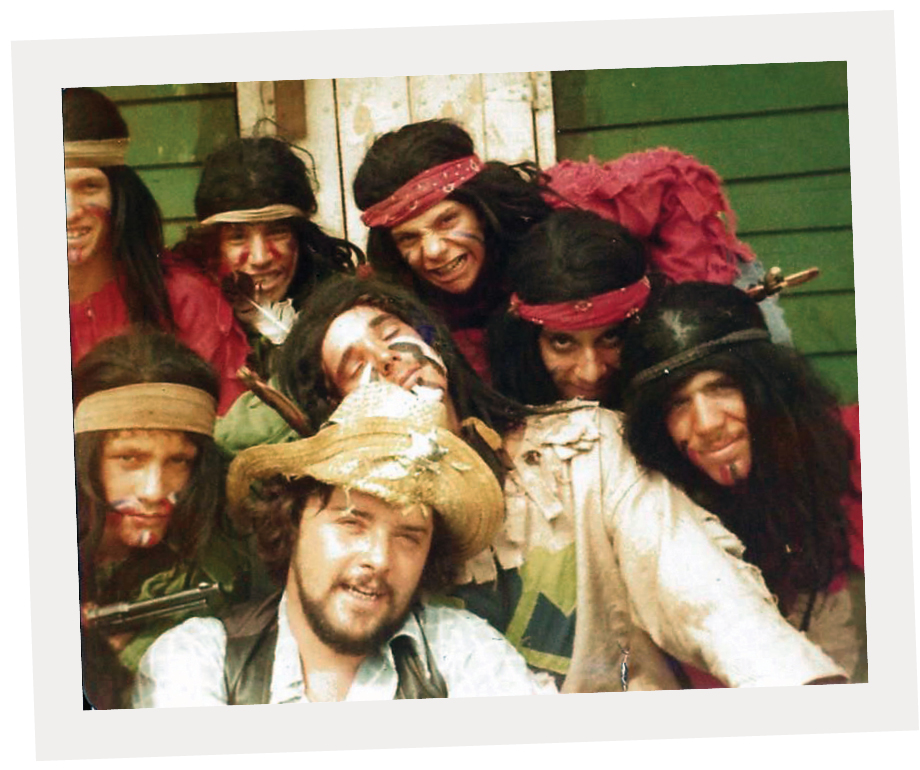
Once upon a time, my job description was “attack the train, terrorize the passengers, chase the pretty showgirls, fight the armed conductors, get killed.” As an Indian in a Wild West show with the Stone Mountain Scenic Railroad, I carried out these duties faithfully, with occasional embellishment, for two consecutive summers in the late 1970s.
The railroad featured steam locomotives that pulled antique-style coaches filled with Stone Mountain Park visitors on a five-mile tour around the mountain. It first opened in 1962 on an industrial spur built more than a century earlier. At some point in the mid-1960s, someone thought to stage a Wild West show featuring an Indian attack. “Indian” is appropriate here because that’s how our characters were scripted. We were a bunch of white, suburban, teenaged boys trained as low-rent stuntmen. Wearing wigs, grease paint, and multicolored cotton jerseys, any resemblance we had to actual Native Americans was accidental or nonexistent.
I joined this tribe with two neighborhood friends, and we became part of a long tradition of palefaces portraying a marginalized people being abused by Caucasians for the sake of entertainment. The irony—that we did all this in the literal shadow of a mountain that features a three-acre carving of Confederate icons on its granite face, a place from which a revitalized Ku Klux Klan emerged—was lost on me back then. I was naive, even for 16. All I wanted to do was meet girls and drink beer.
Looking back now, given the hard enlightenment that comes with age—and knowing people who have lost loved ones to gun violence—I cringe at the truth of what we were engaged in. Here we were, mindlessly glorifying gunplay, nurturing a negative cultural stereotype—a live-action version of a sacred but flawed American mythology, the Western.
But there’s another truth to be spoken, if I’m being honest: It was so much damn fun. I thought of this caustic combination of fun, violence, and intolerance last summer when hundreds of people flooded Stone Mountain Park for a Confederate flag rally in the wake of the slaughter at Emanuel African Methodist Episcopal Church in Charleston.
Hordes of fake Confederates giddily waved Civil War battle flags, banners of sanctioned bullying, bigotry, and racism. Of course, they claimed to be defending what they see as their Southern heritage, as if everything about their culture could be confined to four years of wrongheaded rebellion and bloodshed. How many at the flag rally, I wondered, knew that it had been 100 years since Leo Frank, a Jew, was lynched in Georgia (August 1915), and that later the same year, the Klan had reemerged beneath a burning cross atop Stone Mountain. But hey, at least these enlightened neo-Confederates had the sense to chase off a Klansman who brazenly shambled into the flag rally.
Of course, these wannabe rebels are as bogus and spoiled as we were back in the 1970s. Instead of waving Confederate battle flags, we brandished rubber tomahawks and .22 rifles with blanks. But we were all involved in something profoundly insensitive to a large swath of humanity.

Photograph courtesy of Jim Matalone
For us teenaged Indians, that swath included train passengers; it was our goal to freak them out. As Indians, we were stationed near the halfway point of the circuitous trip in a fake Western town that we called the “set,” miles from any adult supervision. So we drank alcohol, took psychedelic drugs, played poker, committed vandalism. It was like a surreal Lord of the Flies–themed summer camp.
When it was time to perform, we followed the same basic script: A screaming Indian burst from the woods on horseback as the train arrived. The conductors disembarked, guns drawn, to rescue a sheriff tied to a stake behind a blazing fire pit. Indians leapt from hiding places, boarded the train, and chased the showgirls, high-stepping it through a gantlet of howling passengers, avoiding the outstretched legs of smartass kids.
Meanwhile, all around the set, guys got punched, stabbed, bludgeoned, shot, or crushed by giant Styrofoam rocks. We saved the best—or the worst, I suppose—for the final show of the year on Labor Day. Seven of us marched onto the set in single file in our skivvies, the names of the Seven Dwarfs written on our chests in war paint, singing “heigh-ho, heigh-ho,” as one performer rode through on his motorcycle, in lieu of a horse, while another, with a fine rendering of a middle finger on his torso, played a drum solo on a full set of Pearls. When the conductors fired their first shot, we all dropped dead simultaneously.
Since then, some of the weird little world at Stone Mountain has changed. The Indian battle was put to rest around 1980, replaced by a slapstick show involving a bumbling drunk who foils a bad guy named Black Bart. In 1998 the park was privatized. Railroad shows came and went, then disappeared for a decade, until last summer when a comedic good guys/bad guys show debuted, featuring a female sheriff and some actors who weren’t white (a logical move for a park in DeKalb County, one of the most ethnically diverse places in the Southeast).
“We wanted to do something more inclusive and reflective of our visitors, including our residents, who use the park the most,” says Jeanine Jones, spokesperson for Stone Mountain Park.
The park still has Indians. Each fall, for nearly 16 years, the Stone Mountain Indian Festival & Pow-Wow has showcased Native American culture, music, and food. And, to the best of my knowledge, no one gets killed.
“We have a very diverse visitor base and want everyone to feel included and welcome,” Jones says. “Things evolve.”
Well, maybe some things do.
This article originally appeared in our December 2015 issue under the headline “Mountain of Shame.”










![The North Carolina Museum of Natural Sciences’ newest exhibit is a [pre]historic first](https://cdn2.atlantamagazine.com/wp-content/uploads/sites/4/2024/04/DD-3-100x70.jpg)



